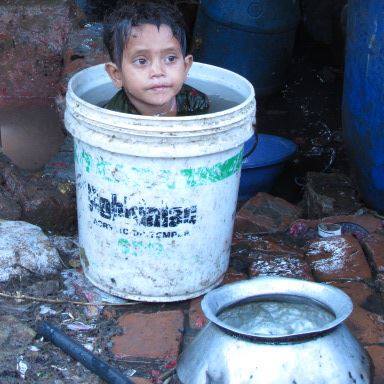
UN Water calls for accelerated action on water and sanitation access

A boy is taking a bath in the Mohammadpur slum in Dhaka, Bangladesh. Photo: Maksudur Rahman
How much water does a four-member family in a slum in Bangladesh use daily? Or how do millions of people in the Horn of Africa region live during this prolonged drought season? In a slum at Bosila, in the Mohammadpur area of Dhaka, Bangladesh, children use a bucket of water to bathe. This amount is roughly equal to the amount of water we use to wash our hands at a tap. This scenario supports the data from water.org, which says 41 percent of the population in Bangladesh—around 68 million people—lack access to a reliable, safely managed source of water. The striking inequity and scarcity of water remind us of the call of World Water Day 2023 to accelerate change to solve the water and sanitation crises. The United Nations calls on individuals to do more to save water, noting that we can make a difference by changing the way we use, consume, and manage water in our lives.
The UN 2023 Water Conference is the first event of its kind in nearly 50 years. Ahead of the conference, a report published by UNESCO on behalf of UN-Water says 2 billion people, or 26% of the world population, do not have safe drinking water, and 3.6 billion people (46%), lack access to safely managed sanitation. This scarcity is caused by a combination of factors, including population growth, climate change, and poor water management practices.
Lack of access to clean water can have serious consequences for human health, including an increased risk of diarrhea and many waterborne illnesses such as cholera, typhoid fever, and hepatitis A. According to the World Health Organization (WHO), more than 800,000 people die each year from diseases caused by inadequate water supply, sanitation, and hygiene. The majority of these deaths occur in developing countries, particularly among children under the age of five. This can be largely prevented through improved water supply, sanitation, and hygiene practices, which can help reduce the incidence of these diseases and save lives.
The UN Water Conference aims to address the water crisis and find solutions to achieve Sustainable Development Goal (SDG) 6 of ensuring the availability and sustainable management of water and sanitation for all by 2030. One of the main outcomes of this conference will be the formulation of the Water Action Agenda, which will capture all water-related voluntary commitments and monitor their progress. The agenda aims to encourage member states, stakeholders, and the private sector to commit to urgent actions to address today’s water challenges. Have you thought about what to write there?


